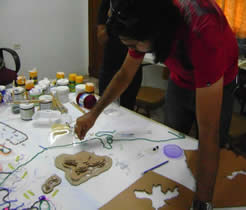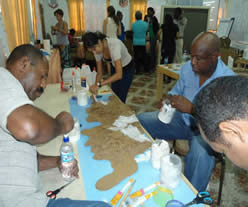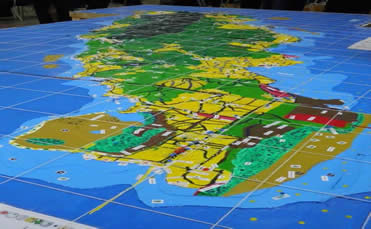CAPACITY BUILDING
Promoting participatory information communication technologies (ICTs) for adding value to traditional knowledge in climate change adaptation, advocacy and policy processes in the Caribbean
Location Caribbean region
Year 2012 - 2013
Funded by Technical Centre for Agricultural and Rural Co-operation ACP-EU (CTA)
Amount USD 81,250
Project Purpose
Increased engagement of stakeholders to adopt ICT to influence climate change adaptation policy processes.
Background
A range of initiatives have been implemented at the global level to assist African, Caribbean, Pacific countries to adapt to climate change, for example, the National Adaptation Programmes of Action (NAPAs) provide a process for Least Developed Countries (LDCs). In addition, the value of grassroots involvement in climate-related decision-making has received attention in several official climate policy documents such as Art. 6 of the United Nations Framework Convention on Climate Change (UNFCCC) (UN, 1992, p. 17). Nonetheless, minority groups including indigenous peoples in many developing countries, whose livelihoods are tied to the sustainability of natural resources, are still largely excluded from climate-related decision-making.
Impacts of climate change in the Caribbean are projected to include sea level rise, ocean warming, and changing rainfall patterns. These impacts are expected to have a significant economic and social impact. These events have caused the diversion of limited resources from other development priorities towards relief, rehabilitation and reconstruction activities.
There are some important initiatives by CANARI, Panos Caribbean and Buccoo Reef Trust, to address these challenges in the Caribbean islands, including using innovative methods to raise public awareness and capture the voice of local communities and traditional knowledge. For example CANARI’s facilitation of the development of a Civil Society Climate Change Agenda for Saint Lucia, and CANARI's piloting of the development and implementation of climate change resilience-building plans by local communities.
Despite these efforts, there is generally weak appreciation of or capacity to facilitate participatory approaches to building resilience to climate change and extreme climatic events. This project will aim to address this deficiency by piloting participatory ICTs as a new tool that can be used in the region to facilitate effective participation by local communities and other stakeholders in the identification of general policy priorities, and specific policies and actions needed at the landscape and site level to address the impacts of climate change and extreme climatic events.
This tool will allow inclusion of relevant knowledge (including traditional / indigenous knowledge), increase capacity, facilitate coordination and collaboration across sectors, and build buy-in for implementation of plans for resilience to climate change and extreme climatic events. See the full project concept note for more detailed information.
Project Goal
Local and traditional knowledge and values are recognized and made more authoritative in decision making about climate change adaptation in the Caribbean region.
Project Activities
Development of mobilisation plan to stimulate interest of key stakeholders to participate in the three dimensional model building exercise in Tobago during the period 29th September to 12th October 2012.
Hosting mobilisation meetings to introduce the project and key concepts in participatory three-dimensional modelling (P3DM) to stakeholders in Tobago and to draft a schedule for groups to populate the model during the period 29th September to 12th October 2012.
Building a P3DM of Tobago and Training of Trainers from the Caribbean region to document, share and combine traditional and other forms of knowledge, identify the risks from climate change and extreme climate events, recommend the adaptation policies and actions required and to catalyse dissemination and use of the tool across the Caribbean islands.
 
Figure 1 and 2: Participants working on the model

Figure 3: The completed 3D model of Tobago
Feedback and reflection workshop to meet with key stakeholders in Tobago to use the P3DM of Tobago to further analyse the impacts of climate change on the island and encourage the use of the model in decision making about climate change adaptation
Publications/documents
Related News Releases
Facebook
YouTube
For more information, contact: Nicole Leotaud - [email protected]
Back to Capacity building programme page
|
